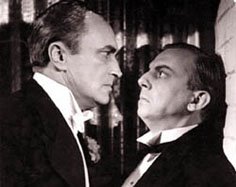The legendary "Archers" – director Michael Powell and writer Emeric Pressburger made "Contraband" in England in 1940, and it’s a classic example of what I talked about above. Set in London during the Blitz, this is a film that knows details such as having a maitre d’ ask a diner if he is bringing a gas mask into the dining room.
The film opens in a small English resort town, as the Navy sees a Danish ship passing, and gives the order for it to be detained. The ship’s captain is Anderson (Conrad Veidt) and he’s a tough cookie. He first refuses to obey the order to stop, and when he finally does, doesn’t go to meet the boarding Brits, instead making them come to him.
We get to briefly meet some of the passengers, most notably Mrs. Sorenson, a strong-willed divorcee played by Valerie Hobson. She and the Captain butt heads early on over her refusal to wear a life jacket, and one of the delights of this film is watching two smart, stubborn people banter.
After an interview, the British officers develop sufficient trust to give Anderson a pair of shore passes, for him and his First Officer Skold. When it comes time to go ashore, the passes are gone and Sorenson and a talent agent named Pidgeon are gone with them. Anderson is furious, and he and Skold head ashore in a small skiff to find them. A schedule torn out of a paper leads Anderson to a train, and he finds his quarry hidden behind an open copy of Variety. He loses Pidgeon, but decides to keep Sorenson close to him.

A trip to her aunt’s house reveals a surprise – There are men waiting for her. There’s a marvelous scene where a German agent who somehow manages to be both warm and menacing questions Sorenson. Anderson listens to this from a couch, and this is how he discovers that she and Pidgeon are agents carrying info about German spy ships.
Anderson and Sorenson are tied to together under the watchful eye of a surveillance camera. The way they plot their escape together is one of the centrepices of the film. Watch as they position themselves so that the camera can only see her, then listen to the sounds of the building. There is someone playing a banjo and a fine male singing voice, and Sorenson gets and idea of the layout of the building from listening to the footsteps above her. Anderson manages to wriggle out of his bonds, and in an inspired plan, starts turning the lights in the building on. London being in curfew and under a blackout, this brings the police to the door, and Anderson gets out.
The problem is, since the entire city is in blackness, he doesn’t know where he was being held. This leads to a search of nightclubs, looking for one with a banjo player and a male singer. He seems to have found the right one, then is told that they have never had a male singer. He is just about to leave, when a female singer starts into a song – A singer with a decidedly masculine voice. Bingo!

The blackout plays a pivotal role in "Contraband." So much so, in fact, that when the film was released in America, it was called "Blackout". The final confrontation with the Nazi spy takes place in the dark; with both men feeling their way around, and trying to get a shot off at one another.
Powell and Pressburger are best known in America for the masterpieces they created a few years later, like "The Red Shoes", "Black Narcissus", and "A Matter of Life and Death", and Powell himself essentially had his career destroyed with "Peeping Tom" in 1960. These films are all high points, but they are by no means the only ones. "Contraband" is one of their notable early films, and it’s a terrific, tight little thriller. It sure feels like it was made by someone who knew what being at war was like.
Note: The credits indicate that Deborah Kerr has a small uncredited role in this. I sure didn’t notice her. If anyone else has, let me know.
No comments:
Post a Comment